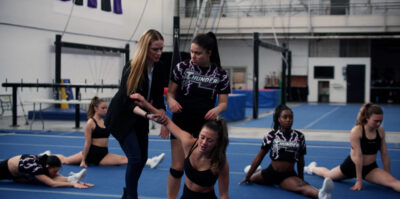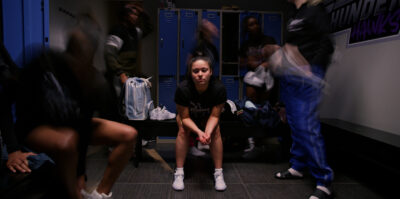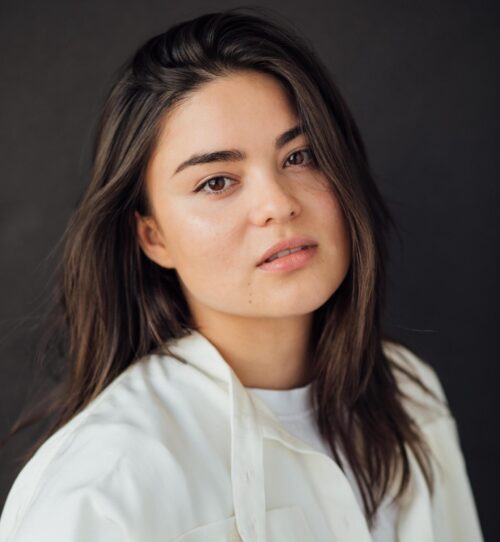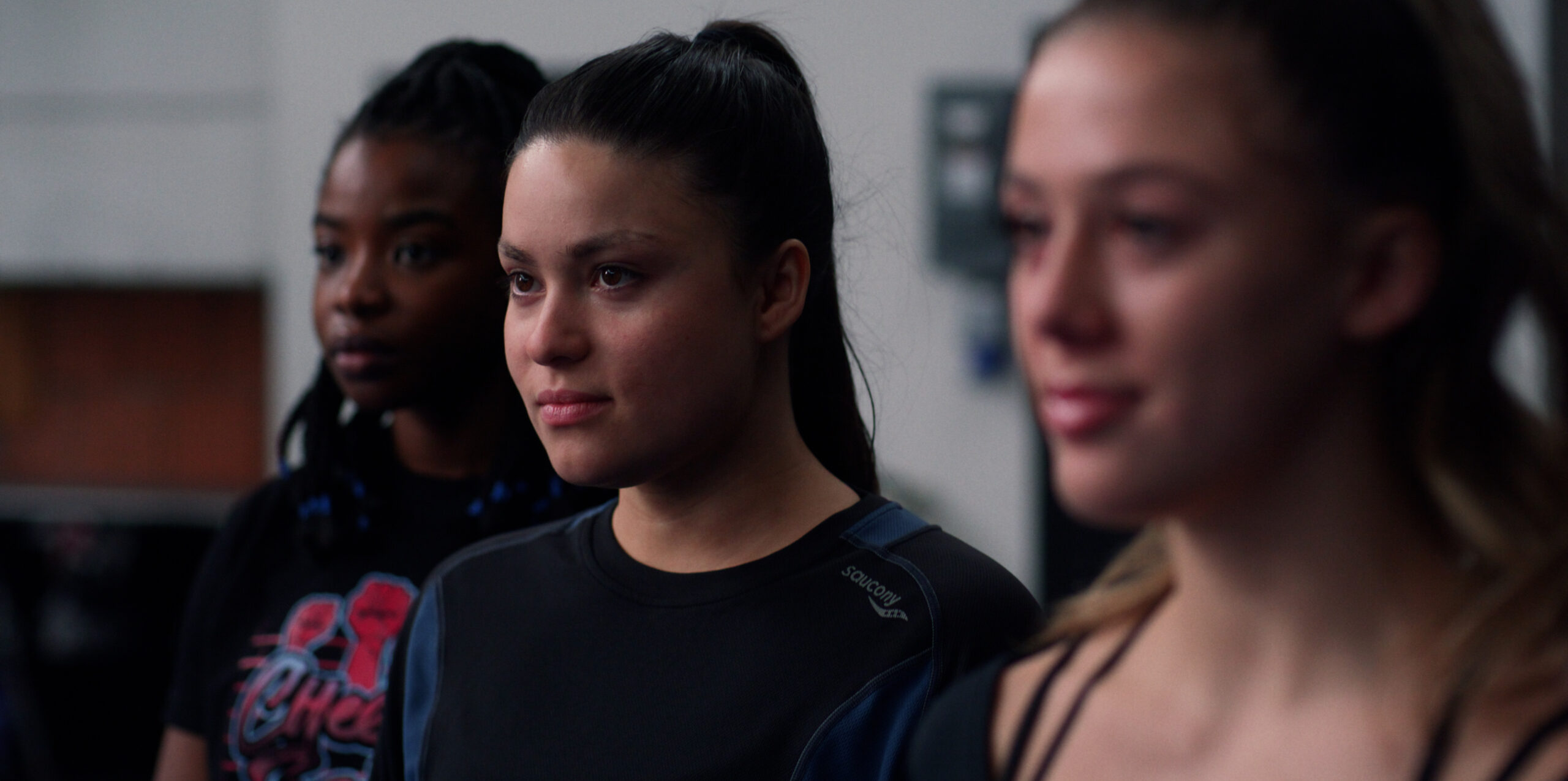At the height of TIFF 2023, on a sunny Saturday afternoon, a team of cheerleaders took over a stretch of King Street. Decked out in shimmery purple and black outfits, the team performed with infectious energy and charm, effortlessly executing back handsprings, handstands and cheer routines in the middle of the buzzing festival. As crowds gathered, their eyes were drawn to the girls lifted high in the air.
But the star of it all had her feet firmly planted on the ground. Devery Jacobs walked alongside the cheerleaders, hyping them up, and handing out info to curious onlookers to promote the world premiere of Backspot, a film about a teenage girl navigating the intense world of all-star cheerleading.
Jacobs stars in the film as Riley, an ambitious cheerleader with a fierce love for the sport. There’s no doubt that Jacobs can shine in the spotlight—she is known for her roles in Reservation Dogs, Marvel’s Echo, American Gods, and The Order. But Backspot is also Jacobs’ producorial debut, and as she shares in our conversation, the work that happens outside of the spotlight is just as important.
“When you think of cheerleading, a lot of people think of the top girl, the girl that gets thrown in the air. But Backspot is about the foundation of the pyramid, the person who is holding their ankles, the person who’s doing the counts, and the person who’s catching the girl if she falls, putting herself at risk,” she says.
Backspot has been a labour of love for Jacobs. Over six years, alongside director D.W. Waterson, she has honed the story and characters, gathered funding, and helped bring on Elliot Page as an executive producer. At the same time, she was focused on bringing the character of Riley to life. Jacobs tells us it’s the role she’s most proud of in her career to date, but also the most physically demanding yet.
“I had to relearn my tumbling moves…I had to learn how to backspot and go through cheer, gymnastics, physiotherapy, personal training…it was something I had to take on myself,” Jacobs says.
As a former competitive gymnast, Jacobs remembers going to the theatre to see Stick It with her teammates, and the camaraderie and pride that came with seeing their sport represented on screen. With Backspot, she’s excited to give cheerleading the same treatment. “There hasn’t been a proper cheer movie since Bring It On,” she says.

The intense athleticism and high standards of the sport are certainly done justice in Backspot. When Riley is recruited to a new elite cheer squad, she goes to extreme lengths to excel, pushed further by her relentless coach (Evan Rachel Wood), and creating tension in her relationship with her girlfriend Amanda (Kudakwashe Rutendo).
Backspot is gritty and raw. It doesn’t shy away from showing how the harsh and often toxic side of cheer culture can impact these young athletes—both physically and mentally.
One of Jacobs’ favourite aspects of Backspot is its portrayal of anxiety and mental health. Several tense, intimate scenes take us into the depths of Riley’s mental health struggles. With a subtle yet powerful performance, Jacobs captures how all-encompassing anxiety can feel, and how internal distress can manifest physically.
This is something so rarely seen on screen (one study shows that fewer than 2% of all film characters experience mental health conditions, and even fewer are LGBTQ2S+ characters)—and Jacobs tells us that this refreshing honesty is resonating with audiences.
“A lot of people have come up to us afterwards talking about how they struggle with OCD, how they struggle with trichotillomania, which is a hair-pulling disorder. These are things that are considered taboo in mainstream society, but they’re actually very common,” says Jacobs. “Making sure that we were getting it right was really important.”

While Riley has many stressors in Backspot, her identity as a queer, Native girl isn’t one of them. Instead, her relationship with Amanda is a source of comfort. Their scenes together are the heart of the film—a goofy and joyful depiction of girlhood and first love.
“We wanted to look at what it looks like to be out and queer now in 2024, as a teenager, and really move past the coming out story. We are now in a world where Riley is living out and proud with her girlfriend on the squad.”
For Jacobs, being queer, or being Native, are only parts of Riley’s identity, not central conflicts in the story. But while seeking financing for Backspot, she received an unsettling piece of feedback.
“One of the responses we got was well, we loved the script, we just didn’t understand why this character was Indigenous. It was never explicitly stated in the film…like there needed to be a reason for Riley being Native,” she says. “It really told me that there’s such a specific lens in which we view Native people, and that’s usually through trauma.”
Last year, Jacobs made headlines for her critique of Killers of the Flower Moon, describing the film as “painful, gruelling, unrelenting and unnecessarily graphic”, adding that the Osage characters felt “painfully underwritten.”
“Indig ppl exist beyond our grief, trauma & atrocities. Our pride for being Native, our languages, cultures, joy & love are way more interesting & humanizing than showing the horrors white men inflicted on us,” she tweeted.
Jacobs’ roles have exemplified this pride—she’s played an array of Indigenous characters with depth, unique quirks and flaws. We loved her vulnerability as star and co-writer of the indie love story This Place, and she is perhaps most well-known as Elora Danan in the comedy series Reservation Dogs, which has received praise for shattering Indigenous stereotypes with authentic, grounded writing. Jacobs also made history as Marvel’s first Mohawk superhero in the animated series What If…?, and recently starred alongside Indigenous talent like Alaqua Cox and Tantoo Cardinal in the Marvel series Echo.
“People really need to broaden their ideas of what they consider Indigenous characters to be,” she says.

Beyond the screen, Jacobs is an outspoken advocate for Indigenous and queer rights. She studied to be a social worker, worked at the Native Women’s Shelter of Montreal, and led protests and rallies as an original founder of the Kahnawà:ke Youth Forum.
This month alone, Jacobs will be receiving two awards that recognize her impact as an advocate and artist. At The Hollywood Reporter Women in Entertainment Canada event, she will receive The Impact Award, given to “trailblazers who are changing the narrative in media…creating opportunities for better representation and voices that reflect the full, authentic lived experiences of women.” At the Canadian Screen Awards, she will be recognized for her global impact with The Radius Award alongside Lamar Johnson, 11 years after earning her first CSA nomination for Rhymes with Young Ghouls.
“My existence being a Kanien’kéha queer person is inherently political,” Jacobs says. “I was raised in Kahnawà:ke Mohawk Territory in the wake of 1990 Oka crisis, and that really shaped who I am and my existence being in resistance to the normal status quo in Western society.”

She tells us that as an actor, she’s willing to explore any type of character with different lived experiences to her own. But when it comes to projects she’s writing, directing or producing, where she’s building the foundation for others to climb on, her passion lies in stories about her identities as an Indigenous and queer person.
“In terms of activism, and my queerness and my Indigeneity…entwining it and entrenching it with the storytelling that I do and with the passion that I have for this medium is something that just goes hand in hand for me.”
Jacobs is continuing this mission with several projects in the works at Night is Y, her production company with Waterson that focuses on uplifting queer and Indigenous voices.
“My creative dream is to be an elder in the community, and to look around and see an industry that I’ve been one piece of in helping create,” Jacobs says. “Where a bunch of people I don’t know, a bunch of stories where I can’t even keep up with…. And that we get to leave this industry a better place than when we came into it.”
Backspot is coming to theatres on May 31.




 Follow Us On Instagram
Follow Us On Instagram
